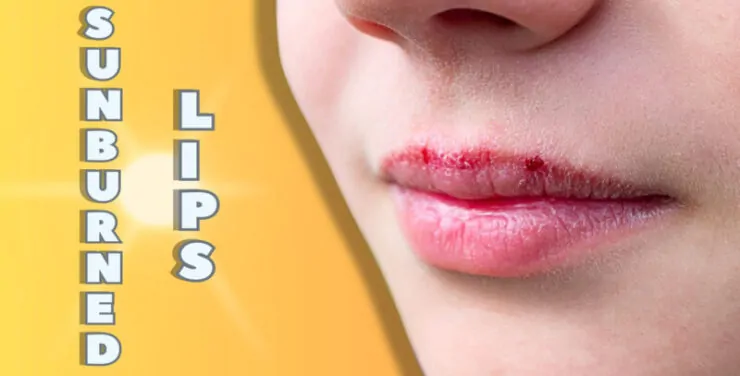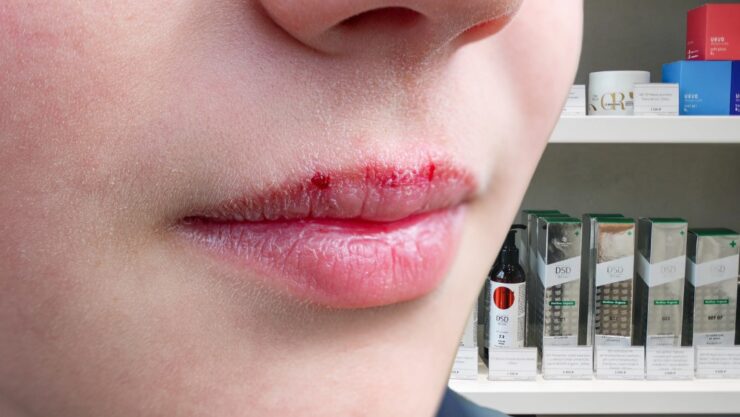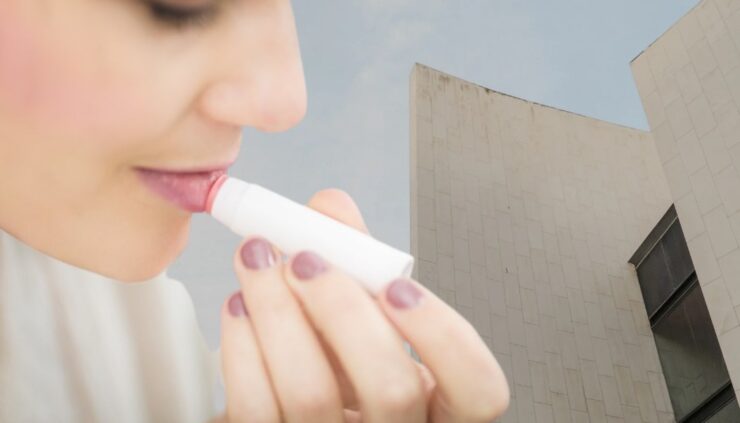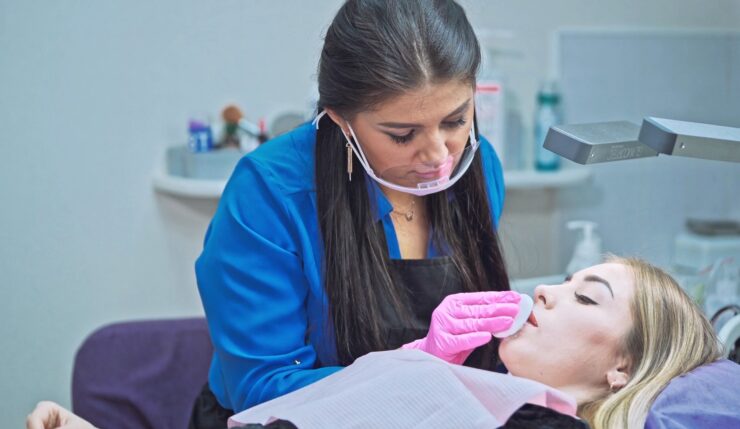The thin, delicate skin on our lips is uniquely susceptible to the sun’s harmful UV rays, leading to painful conditions such as sunburn, blisters, and swollen lips.
Just as sunburn on our skin can lead to long-term issues like premature aging and skin cancer, sunburned lips are also associated with similar risks. It’s crucial to understand the causes, symptoms, and treatments to effectively combat this uncomfortable condition.
Key takeaways
- Lips, lacking melanin, are highly prone to sunburn and long-term issues like skin cancer.
- Sunburned lips, caused by UV overexposure, show symptoms like redness and swelling.
- Treatments include cleaning the area, applying cold compresses, and using natural remedies.
- Prevent sunburn by applying SPF lip balm, wearing hats, and staying in the shade. Seek medical help for severe symptoms or if conditions worsen.
Causes and Symptoms
Sunburned lips primarily occur due to overexposure to the sun’s ultraviolet (UV) radiation. The lips lack melanin, the pigment that helps protect the skin from UV rays, making them especially vulnerable.
When you stay out in the sun for too long without adequate protection, your lips may suffer from sunburn. Other factors, such as certain medications or lip balms with chemical irritants, may also increase your lips’ sensitivity to the sun.
The symptoms of sunburned lips may not be apparent immediately after sun exposure. It usually takes a few hours for signs to develop. The most common symptoms include:
- redness,
- a burning sensation,
- swelling,
- tightness,
- and blistering.
In severe cases, the lips may bleed or form a crust. Moreover, sunburned lips can become extremely dry and start to peel. As the burn begins to heal, you might experience itching or tingling sensations.
Blisters and Swelling
Sunburn blisters on the lips are a result of severe sunburn. They form as the skin tries to heal and protect itself from further damage. These blisters can be quite painful and might take several days to a week to heal.
As tempting as it might be, it’s essential not to pop these blisters – doing so can expose the sensitive, new skin underneath to infection and slow the healing process.
Swelling results from the body’s inflammatory response to the sunburn damage, sending more blood to the area to aid in healing. However, the increased blood flow can result in a puffy appearance and discomfort.
Severe swelling might interfere with eating, drinking, and talking. Applying a cold compress and keeping your head elevated can help reduce swelling. If these symptoms persist or get worse, it’s crucial to consult a healthcare professional.
Effective remedies and solutions
According to the National Library of Medicine, sunburns hurt the most between 6 and 48 hours after being in the sun. Treating sunburned lips requires a two-pronged approach – soothing the immediate discomfort and promoting healing.
- Start by gently cleaning the area with cold water and mild soap. This step can help prevent infections, especially if there are blisters or cracks on the lips.
- Applying a cold compress or ice pack wrapped in a soft cloth can also provide instant relief from the burning sensation. This method reduces inflammation and numbs the pain temporarily. Remember not to apply ice directly to the lips, as it can cause tissue damage.
- Keeping your body hydrated helps expedite the healing process. Drink plenty of fluids as dehydration can exacerbate the dryness and peeling of the lips. You should also avoid hot, spicy, or acidic foods until your lips have fully recovered, as these could irritate the damaged skin.
Home remedies and natural treatments
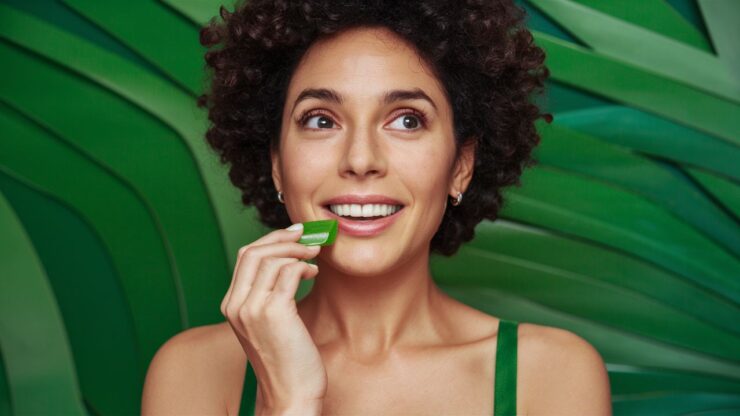
As Shaheen Naser states a few natural remedies can do wonders when it comes to sunburns.
Aloe Vera, known for its soothing properties, can be applied directly to the affected area. Its anti-inflammatory effect helps reduce swelling, while its nourishing components aid in healing.
Honey is another great natural remedy. It’s an excellent moisturizer and contains antibacterial properties that can prevent infections, especially in severe cases where blisters are present. Applying a small amount of pure honey can provide immediate relief.
Also, coconut oil, known for its hydrating and anti-inflammatory properties, can soothe sunburned lips, or even white spots, and promote healing. Apply a small amount on your lips several times a day until you see improvement.
How to protect your lips from sunburn?
The best way to protect your lips from sunburn is by using a lip balm with a high Sun Protection Factor (SPF). Apply it generously and frequently, especially when you’re spending prolonged periods outdoors. Lip balms with SPF not only protect your lips from sunburn but also keep them hydrated.
Wearing wide-brimmed hats and using sun umbrellas can provide additional protection against the sun. If you’re near water, snow, or sand, be extra cautious, as these surfaces can reflect the sun’s rays and increase the risk of sunburn.
It’s also crucial to avoid sun exposure during peak hours (10 AM to 4 PM), when the sun’s UV radiation is the strongest. If you have to be outdoors, try to stay in the shade as much as possible.
When to consult a doctor?
While most cases of sunburned lips can be treated at home, there are circumstances when medical attention is required. If your lips are severely swollen, have blisters that cover a large area, or show signs of infection like pus or increased redness, you should see a healthcare professional.
Experiencing fever, chills, nausea, or faintness might indicate sun poisoning, a severe form of sunburn that requires immediate medical attention. Chronic or recurrent lip sunburn is also a concern and should be evaluated by a doctor as it can increase the risk of skin cancer.
If your sunburned lips do not improve after a week of self-care, it’s wise to consult a doctor. They may prescribe stronger treatments or investigate underlying conditions that could be hindering the healing process.
Sunburned lips in children
Children’s skin is more delicate than adults, making them more susceptible to sunburn. Protecting their lips is just as crucial. Always apply a child-safe SPF lip balm when they’re outdoors. Opt for water-resistant options if they’ll be swimming.
If your child’s lips get sunburned, apply a cold compress to soothe the burn. Over-the-counter children’s pain relievers can be used under a healthcare professional’s guidance. Keep them hydrated and ensure they avoid spicy and acidic foods that can irritate the lips.
Consult a doctor immediately if the sunburn seems severe, if there are blisters, or if your child experiences symptoms like fever or chills.
FAQs
I’m a dermatologist who loves studying and treating skin (obviously). I went to medical school and chose dermatology because I wanted to help people with skin problems. I’m dedicated to helping people feel better about their skin (and in it).
Related Posts:
- White Spots on Lips - Causes, Pictures, Small, on…
- Itchy Palms: Causes, Symptoms, Remedies, and Treatment
- Frequent Urination with Diabetes - Causes, Symptoms,…
- How to Take Good Care of Your Skin in 60s and 70s
- How to Avoid Scams and Surf The Internet Safely -…
- How to Get Rid of Dark Inner Thighs + Causes,…

